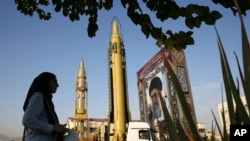Speaking at the recent United Nations Security Council briefing on nonproliferation and Iran, Deputy U.S. Representative to the United Nations Richard Mills expressed concern regarding Iran’s nuclear and ballistic missile activities.
The first concern is Tehran’s lack of cooperation with the International Atomic Energy Agency’s critical verification and monitoring responsibilities involving Iran’s nuclear safeguards. In June, the IAEA Board of Governors adopted a resolution expressing “profound concern” that safeguards issues remain outstanding due to insufficient substantive cooperation by Iran. “Iran must provide the required cooperation necessary to resolve the IAEA’s concerns without further delay,” he said.
Ambassador Mills also called on UN member States to fully implement Annex B of UN Security Council Resolution 2231. He noted that “restrictions remain in place on transfers to and from Iran of certain ballistic missile and nuclear-related items, and individuals and entities on the 2231 list remain subject to an asset freeze.”
The recent bi-annual report by the UN Secretary- General on the implementation of Resolution 2231 found that ballistic missiles launched at Saudi Arabia and the UAE, or the missiles’ component parts, were of Iranian origin. So were the unmanned aerial vehicles, which were also used in attacks against the two countries.
“The United States strongly condemns these attacks,” said Ambassador Mills. “Iran’s continued proliferation of weapons to its proxies and partners in the region must stop.” So, he stated, must Iran’s continued activity related to ballistic missiles designed to be capable of delivering nuclear weapons, including Iran’s development of space launch vehicles with virtually identical technology. “Launches using such technology,” he noted, “are the exact type of activity the Security Council clearly called upon Iran not to undertake.”
“The Security Council must be clear and united in condemning this activity,” Ambassador Mills emphasized. “When Iran defies the Security Council repeatedly – without consequence - it undermines the fundamental credibility of this Council.”
Regarding the possibility of a mutual return by Iran and the United States to full implementation of the JCPOA, Ambassador Mills said the United States “remains ready” to do so and is confident such a return “would significantly advance international security.” The ball,” he declared, “is in Iran’s court, and the choice to move back towards full implementation of the JCPOA rests with Iran.”
Iran Must Be Held Accountable for Prohibited Proliferation and Missile Activity

Speaking at the recent United Nations Security Council briefing on nonproliferation and Iran, Deputy U.S. Representative to the United Nations Richard Mills expressed concern regarding Iran’s nuclear and ballistic missile activities.





